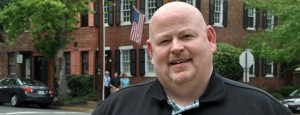Local
‘Reel’ debt delays festival
Acclaimed LGBT film event moved to April due to money woes

Larry Guillemette of One In Ten, the non-profit group that organizes Reel Affirmations, said fundraising challenges forced the event to be rescheduled to April 2011. (Washington Blade photo by Michael Key)
An inability to raise the money needed to hold D.C.’s annual LGBT film festival this October has spurred a decision to reschedule Reel Affirmations for spring 2011, according to organizers and sources familiar with the event.
The money problems also prompted organizers to reassess the time of year the event should be held, leading to a permanent rescheduling of the highly acclaimed event for late April and early May in succeeding years.
Larry Guillemette, marketing and sponsorship manager for One In Ten, the non-profit group that has organized Reel Affirmations each October for the past 19 years, acknowledged that a debt exceeding $40,000 from last year’s festival and a diminishing number of corporate sponsors and donors made it difficult to pull together the festival this year.
It had been scheduled to take place Oct. 14-23 in a number of prominent city theaters, including the Harmon Center for the Arts, the Goethe Institute and the E Street Cinema downtown, the Jewish Community Center near Dupont Circle and the AFI Theater in Silver Spring.
“As with a lot of non-profit organizations in our nation’s capital, gay or straight, we are faced with the same [monetary] challenges,” Guillemette said.
“What we found ourselves doing this year was going to various different organizations that we were hoping might sponsor us. And the economy being what it is, that kind of ability to support us wasn’t there,” he said.
Guillemete said One In Ten will screen three LGBT films this fall, including an award-winning film the group planned to announce soon. Beginning in November, One In Ten will resume a practice it previously discontinued: a monthly showing of an LGBT film in Washington at different theaters.
The group’s ability to hold the full festival in October was further hampered by last year’s resignation of Margaret Murray, who had served as One In Ten’s executive director since 2006, Guillemette said. He noted that it was Murray’s job to work on corporate and organizational sponsorships and other fundraising efforts for the 2010 festival beginning in the latter months of 2009.
“What that did for us on some levels is put us in a tiny bit of a period of flux and transition that we weren’t necessarily prepared for because that was the time of year that most festivals are putting together their proposals for funding for the following year,” he said.
Meanwhile, the group’s debt and general shortage of funds prevented the hiring of someone to replace Murray, who left to take a new job, he said.
At the time of Murray’s departure in November, Guillemette said, One In Ten had become nearly an all-volunteer organization, returning to its “roots” before its first executive director was hired in 2000.
Joe Bilancio, One In Ten’s programs manager and the person in charge of obtaining the films, is being compensated as a consultant, Guillemette said. Guillemette is serving as a volunteer and called his work on the festival “a labor of love.”
According to Guillemette, the funding problems were just one of several issues that prompted the One In Ten board to move the annual festival to the spring. He said other factors included competing LGBT events in October, such as the Human Rights Campaign’s annual national dinner and the Miss Adams Morgan drag pageant, a large event that attracts participants who might otherwise attend the film festival.
Guillemette said the problems associated with holding the festival this October led to long discussions on something the event’s organizers have contemplated for a number of years: the advantages of holding a film festival in the early months of the year.
Among other things, top-quality LGBT-related films made by independent filmmakers are usually released in the early part of the year and shown at other film festivals in the winter and spring, said Guillemette and Bilancio. The two noted that by the time One In Ten’s Reel Affirmations festival is held in the fall, some of the patrons of Reel Affirmations have already seen these films at other festivals.
In recent years, a number of films shown at Reel Affirmations and other LGBT film festivals also have been shown first on gay cable television networks, with others sometimes available through Netflix, said Guillemette and Bilancio.
“It’s significantly different than what it was when we started the festival in the early 1990s, when access to independent gay film was not that easy,” Guillemette said. “And we could count on a sold-out festival because there weren’t options like Neflix and Logo and Here TV and other things.”
Although moving the festival to the spring won’t counter the competing venues for gay film, Bilancio said holding Reel Affirmation in the early part of the year will at least ensure that it’s the first opportunity for most D.C. festival goers to see the films.
One source familiar with last year’s Reel Affirmations festival, who spoke with the Blade on condition of anonymity, said the One In Ten debt stemmed from a drop in revenue compared to previous festivals. Ticket sales were down as was advertising in the festival’s lengthy program booklet, the source said.
Instead of generating seed money for the 2010 festival, which was slated to celebrate Reel Affirmations’ 20th anniversary, the revenue shortfall resulted in debts to various vendors, including the graphic artist who helped produce the program booklet. At least $20,000 to $25,000 was needed to produce the booklet for this year, a sum the group apparently did not have, the source said.
Organizers were hopeful that a special town hall meeting that One In Ten held in April at the Human Rights Campaign headquarters would persuade people to make the donations that were needed to keep the event on track for October. But less than $5,000 was raised as a result of the town meeting, the source said, an amount far less than was needed to stage the festival in October.
Guillemette, who was not among the festival organizers last year, said still other factors were at play, including foul weather during several evenings of the October 2009 festival. He also noted that an earlier decision to discontinue the festival’s VIP membership program, which provided special benefits to large donors, made the festival more reliant on single ticket sales, which were down in 2009.
He said the board this year reinstated the VIP membership program and is taking other steps to better promote the spring festival.
“We’re not burying our head in the sand. We fully acknowledge there were things that needed to be changed in the way we did things,” he said. “And I think we brought back the right team to make those changes.”
Lisa King, One In Ten’s board president, declined to comment, deferring to Guillemette as the organization’s spokesperson. Murray could not be immediately reached for comment.

In an official statement released at the reveal event Capital Pride Alliance described its just announced 2026 Pride theme of “Exist, Resist, Have the Audacity” as a “bold declaration affirming the presence, resilience, and courage of LGBTQ+ people around the world.”
The statement adds, “Grounded in the undeniable truth that our existence is not up for debate, this year’s theme calls on the community to live loudly and proudly, stand firm against injustice and erasure, and embody the collective strength that has always defined the LGBTQ+ community.”
In a reference to the impact of the hostile political climate, the statement says, “In a time when LGBTQ+ rights and history continue to face challenges, especially in our Nation’s Capital, where policy and public discourse shape the future of our country, together, we must ensure that our voices are visible, heard, and unapologetically centered.”
The statement also quotes Capital Pride Alliance CEO and President Ryan Bos’s message at the Reveal event: “This year’s theme is both a declaration and a demand,” Bos said. “Exist, Resist, Have Audacity! reflects the resilience of our community and our responsibility to protect the progress we’ve made. As we look toward our nation’s 250th anniversary, we affirm that LGBTQ+ people have always been and always will be part of the United States’s history, and we will continue shaping its future with strength and resolve,” he concluded.
District of Columbia
Capital Pride board member resigns, alleges failure to address ‘sexual misconduct’
In startling letter, Taylor Chandler says board’s inaction protected ‘sexual predator’

Taylor Lianne Chandler, a member of the Capital Pride Alliance Board of Directors since 2019 who most recently served as the board’s secretary, submitted a letter of resignation on Feb. 24 that alleges the board has failed to address instances of “sexual misconduct” within the Capital Pride organization.
The Washington Blade received a copy of Chandler’s resignation letter one day after she submitted it from an anonymous source. Chandler, who identifies as transgender and intersex, said in an interview that she did not send the letter to the Blade, but she suspected someone associated with Capital Pride, which organizes D.C.’s annual LGBTQ Pride events, “wants it out in the open.”
“It is with a heavy heart, but with absolute clarity, that I submit my resignation from the Capital Pride Alliance Board of Directors effective immediately,” Chandler states in her letter. “I have devoted nearly ten years of my life to this organization,” she wrote, pointing to her initial involvement as a volunteer and later as a producer of events as chair of the organization’s Transgender, Gender Non-Conforming, and Intersex Committee.
“Capital Pride once meant something profound to me – a space of safety, visibility, and community for people who have often been denied all three,” her letter continues. “That is no longer the organization I am part of today.”
“I, along with other board members, brought forward credible concerns regarding sexual misconduct – a pattern of behavior spanning years – to the attention of this board,” Chandler states in the letter. “What followed was not accountability. What followed was retaliation. Rather than addressing the substance of what was reported, officers and fellow board members chose to chastise those of us who came forward.”
The letter adds, “This board has made its priorities clear through its actions: protecting a sexual predator matters more than protecting the people who had the courage to come forward. … I have been targeted, bullied, and made to feel like an outsider for doing what any person of integrity would do – telling the truth.”
In response to a request from the Blade for comment, Anna Jinkerson, who serves as chair of the Capital Pride board, sent the Blade a statement praising Taylor Chandler’s efforts as a Capital Pride volunteer and board member but did not specifically address the issue of alleged sexual misconduct.
“We’re also aware that her resignation letter has been shared with the media and has listed concerns,” Jinkerson said in her statement. “When concerns are brought to CPA, we act quickly and appropriately to address them,” she said.
“As we continue to grow our organization, we’re proactively strengthening the policies and procedures that shape our systems, our infrastructure, and the support we provide to our team and partners,” Jinkerson said in her statement. “We’re doing this because the community’s experience with CPA must always be safe, affirming, empowering, and inclusive,” she added.
In an interview with the Blade, Chandler said she was not the target of the alleged sexual harassment.
She said a Capital Pride investigation identified one individual implicated in a “pattern” of sexual harassment related behavior over a period of time. But she said she was bound by a Non-Disclosure Agreement (NDA) that applies to all board members and she cannot disclose the name of the person implicated in alleged sexual misconduct or those who came forward to complain about it.
“It was one individual, but there was a pattern and a history,” Chandler said, noting that was the extent of what she can disclose.
“And I’ll say this,” she added. “In my opinion, with gay culture sometimes the touchy feely-ness that goes on seems to be like just part of the culture, not necessarily the same as a sexual assault or whatever. But at the same time, if someone does not want those advances and they’re saying no and trying to push you away and trying to avoid you, then it makes it that way regardless of the culture.”
When asked about when the allegations of sexual harassment first surfaced, Chandler said, “In the past year is when the allegation came forward from one individual. But in the course of this all happening, other individuals came forward and talked about instances – several which showed a pattern.”
Chandler’s resignation comes about five months after Capital Pride Alliance announced in a statement released in October 2025 that its then board president, Ashley Smith, resigned from his position on Oct. 18 after Capital Pride became aware of a “claim” regarding Smith. The statement said the group retained an independent firm to investigate the matter, but it released no further details since that time. Smith has declined to comment on the matter.
When asked by the Blade if the Smith resignation could be linked in some way to allegations of sexual misconduct, Chandler said, “I can’t make a comment one way or the other on that.”
Chandler’s resignation and allegations come after Capital Pride Alliance has been credited with playing the lead role in organizing the World Pride celebration hosted by D.C. in which dozens of LGBTQ-related Pride events were held from May through June of 2025.
The letter of resignation also came just days before Capital Pride Alliance’s annual “Reveal” event scheduled for Feb. 26 at the Hamilton Hotel in which the theme for D.C.’s June 2026 LGBTQ Pride events was to be announced along with other Pride plans.
District of Columbia
Capital Stonewall Democrats elect new leaders
LGBTQ political group set to celebrate 50th anniversary

Longtime Democratic Party activists Stevie McCarty and Brad Howard won election last week as president and vice president for administration for the Capital Stonewall Democrats, D.C.’s largest local LGBTQ political organization.
In a Feb. 24 announcement, the group said McCarty and Howard, both of whom are elected DC Advisory Neighborhood Commissioners, ran in a special Capital Stonewall Democrats election to fill the two leadership positions that became vacant when the officers they replaced resigned.
Outgoing President Howard Garrett, who McCarty has replaced, told the Washington Blade he resigned after taking on a new position as chair of the city’s Ward 1 Democratic Committee. The Capital Stonewall Democrats announcement didn’t say who Howard replaced as vice president for administration.
The group’s website shows its other officers include Elizabeth Mitchell as Vice President for Legislative and Political Affairs, and Monica Nemeth as Treasurer. The officer position of secretary is vacant, the website shows.
“As we look toward 2026, the stakes for D.C. and for LGBTQ+ communities have never been clearer,” the group’s statement announcing McCarty and Howard’s election says. “Our 50th anniversary celebration on March 20 and the launch of our D.C. LGBTQ+ Voter’s Guide mark the beginning of a major year for endorsements, organizing, and coalition building,” the statement says.
McCarty said among the organization’s major endeavors will be holding virtual endorsement forums where candidates running for D.C. mayor and the Council will appear and seek the group’s endorsement.
Founded in 1976 as the Gertrude Stein Democratic Club, the organization’s members voted in 2021 to change its name to Capital Stonewall Democrats. McCarty said the 50th anniversary celebration on March 20, in which D.C. Mayor Muriel Bowser and members of the D.C. Council are expected to attend, will be held at the PEPCO Gallery meeting center at 702 8th St., N.W.




















